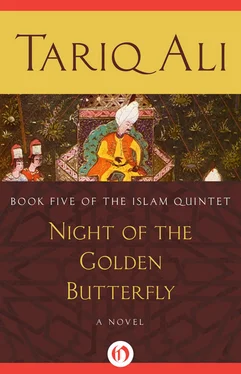‘“The sight of your breasts sends me to sleep.” Stupid Plato.’
Half an hour later: ‘Are stupid people generally more happy than more intelligent ones?’
‘Zaynab, it’s nearly two in the morning.’
‘So what? Why, can’t you sleep? But first please answer my question.’
‘How the hell should I know? Make a list of your family members and answer your own question.’
‘I know some really stupid ones, but that’s not my point. What I mean is whether or not they even understand the concept of happiness.’
I turned off the light and took her in my arms.
SIX MONTHS LATER, WHEN I returned to Paris, it was difficult to ignore the fact that Naughty Lateef had taken the city by storm.
Her book was out. It had been sold to every large publishing corporation in the world. The advances had been modest, since the industry — was in severe crisis, but for this book subventions had been promised by various foundations and cultural organizations to cover the losses. Posters with Naughty’s image were everywhere. She had changed her name to something that was both user-friendly and exotic. She was now Yasmine Auratpasand. The market would respond well to that, with a tiny bit of encouragement from the publishers’ marketing directors. Their shrewdness and cynicism would both ensure good sales and, much more importantly, project the author straight into the world of celebrity. Unlike her male equivalents, she did not need any medical help in the way of a hair transplant or what is unappetizingly referred to as a nose job. Naughty was a healthy Punjabi girl with rustic good looks. All she required was some work on her English diction, but not too much, and on her overeager smile, which she was asked to make a touch more refined, a bit more modest, just enough so that she did not seem to be enjoying her new status quite as much as she actually did. The mediacrats were instructed to go easy on her, at the same time making sure that she became an overnight celebrity. That was important, since she needed to be used to justify, in the sweetest and mildest manner possible, every Western atrocity in Muslim lands requiring justification and simultaneously help to prepare public opinion to accept future crimes. What must be avoided was too early a comparison of her writing with Voltaire’s. That claim had seriously discredited a previous operation of this sort, and Washington had been forced to step in and transport the heroine in question to the safety of a right-wing think-tank. Perhaps in six months’ time the phrase ‘there is a touch of Diderot in her work’ could be suggested to Jean-Pierre Bertrand, the host of Orinico.com, the travelling book show aired on France 2, which was filmed on a cargo plane and sponsored by the eponymous company.
The interview with Naughty in Le Monde had been conducted or, if readers will pardon a homely truth, written, by one of Zaynab’s dinnerparty guests, who, like most senior journalists in the Western world, wrote copy as imaginative as any of those gallant captains who enlivened the sixteenth century with tales of adventures in unknown worlds where they killed countless brigands and a vast number of heathens. (Those stories in their day had inspired or provoked hundreds of satirical and, sometimes, extremely vulgar sonnets, which were secretly admired by many.)
In our twenty-first century, a Muslim woman’s real virtues cannot be appreciated on their own, but like the adventurous captains’ have to be spiced up with stories, imagined or real, of courage in the face of overwhelming odds — in her case, of Islamist tyranny. And since the struggle against this tyranny is led by humanitarian politicians and generals with high collateral from the Western world, they and their global network of media acolytes become the final arbiters of what these women’s books are worth. Zaynab, an unsung Muslim heroine of valour, had followed Naughty’s antics with a sense of horror, but also with growing admiration.
Now she looked at the clock and rushed to switch on her television to Arte. ‘It’s the only thing left worth watching… sometimes. There were more serious debates on Fatherland TV networks during the military period. Not now.’
‘What are we watching?’
‘Shhh.’
Arte had decided to broadcast a live double interview with Naughty and a critic of hers, a hijab-clad Maghrebian Frenchwoman. Their two points of view were to be offered to the viewers as an either-or choice. Zaynab would not let me switch it off, nor would she allow me to leave the room. The show was live, she said, and anything could happen, which I strongly doubted. Very rarely are these things left to chance, and unforeseen spontaneity is muzzled the moment it rears its unwelcome head.
The silk-shirted interviewer sharing a bit of his hairy chest — it was the ubiquitous Bertrand — introduced the two women in a husky French voice. I preferred reading the German sub-titles.
‘Yasmine Auratpasand, of course, is familiar to you. Her struggle for enlightenment in a dark world has inspired us greatly. In the right corner is Yusufa al-Hadid, a young schoolteacher who has published a slightly undiplomatic criticism of Madame Auratpasand’s work in Le Monde Diplomatique , where else?’
He attempted to amuse us with his boxing-match terms, also meant to assure us that he was only the referee. His task was to separate the combatants if the fight became too rough, to prevent any fouls, and to pose a new question whenever he deemed a round completed. To set the tone for this new objectivity, he showed the audience a ten-minute film on Naughty’s world and the society that produced her. Beards, bombs, horrific footage of Taliban touts flogging a woman, statistics of honour killings, ‘balanced’ by interviews with a few good people in Fatherland, mainly women, who pointed out that most women who were put to death were killed in the family and not by fundamentalists. Then interviews with many bad people who wanted more wars, supported the drones, and accepted with sad faces that the collateral damage was a price that had to be paid for freedom. I wondered whether they would be saying that if their families had been wiped out. Intercut with all this were images of Naughty in peaceful Paris, reflecting on the difference between the two worlds. Wonderful stuff. Just like a boxing match whose outcome has been decided in advance — as long as the fall guy sticks to the bargain. I assumed that in Yusufa al-Hadid they had found a particularly obtuse young Islamist who would knock herself out, since Naughty had to stick to her script and was incapable of a killer blow. I was wrong.
The young woman with the covered head began to speak. In a deceptively gentle voice, she congratulated the director for giving us a film from which all unpleasant images of Parisian cops harassing black people had been eliminated. This could not have an easy accomplishment in ‘our Paris’. Why had they filmed Madame Auratpasand exclusively in the arcades? Bertrand concealed his irritation with a patronizing smile. She was, of course, entitled to her opinions, because France was a free country. This remark, of course, implied that al-Hadid was not French, but some other, unspecified, nationality. Then he began posing his intelligent-sounding but banal questions.
Naughty had been effectively tutored and carefully rehearsed. Her French was improving daily. At one point she said, with a sigh, ‘What a joy it is to read Diderot.’
Bertrand gushed, ‘I must confess that after reading your own work I said to Justine, my wife — a famous opera singer, by the way, and a great fan of your work — that I think we have a new talent amongst us. A woman from a war zone with a touch of Diderot.’
The camera lingered, first on his chest and then on hers. Before he could resume, Yusufa interrupted in a calm and reasonable voice:
Читать дальше












